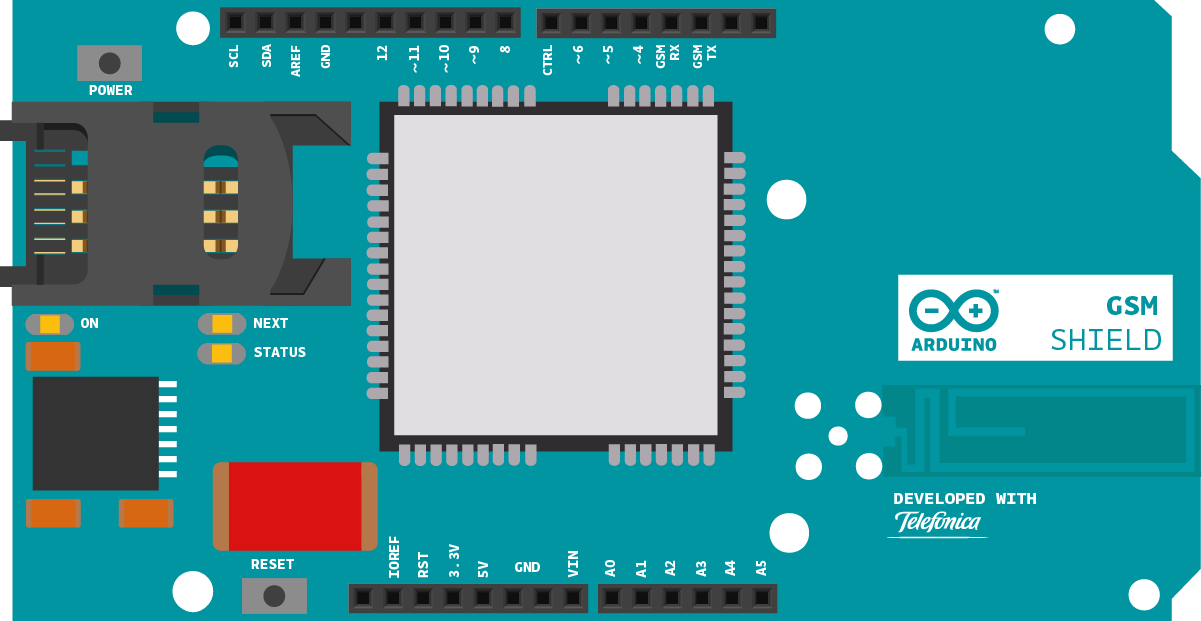Eğitimler
GSMToolsBandManagement
Bu örnek, GSM kalkanını yönetmek için sağlanan araçların bir parçasıdır ve modemin bağlandığı GSM bandını yönetmek için GSM Kütüphanesinin nasıl kullanılacağını gösterir.
Genel GSM bandı bilgileri için http://www.worldtimezone.com/gsm.html adresini ziyaret edin. Tipik bölgesel yapılandırmalar:
- Avrupa, Afrika, Orta Doğu: E-GSM (900) + DCS (1800)
- ABD, Kanada, Güney Amerika: GSM (850) + PCS (1900)
- Meksika: PCS (1900)
- Brezilya: GSM (850) + E-GSM (900) + DCS (1800) + PCS (1900)
Gerekli Donanım
- Arduino veya Genuino Kurulu
- Arduino + Telefonica GSM / GPRS Kalkanı
- SIM kart
Devre

Kod
This sketch, for the Arduino GSM shield, checks the band currently configured in the modem and allows you to change it. /*
Band Management
This sketch, for the Arduino GSM shield, checks the band
currently configured in the modem and allows you to change
it.
Please check http://www.worldtimezone.com/gsm.html
Usual configurations:
Europe, Africa, Middle East: E-GSM(900)+DCS(1800)
USA, Canada, South America: GSM(850)+PCS(1900)
Mexico: PCS(1900)
Brazil: GSM(850)+E-GSM(900)+DCS(1800)+PCS(1900)
Circuit:
* GSM shield
created 12 June 2012
by Javier Zorzano, Scott Fitzgerald
This example is in the public domain.
*/
// libraries
#include <GSM.h>
// initialize the library instance
GSMBand band;
void setup() {
// initialize serial communications and wait for port to open:
Serial.begin(9600);
while (!Serial) {
; // wait for serial port to connect. Needed for Leonardo only
}
// Beginning the band manager restarts the modem
Serial.println("Restarting modem...");
band.begin();
Serial.println("Modem restarted.");
};
void loop() {
// Get current band
String bandName = band.getBand(); // Get and print band name
Serial.print("Current band:");
Serial.println(bandName);
Serial.println("Want to change the band you’re on?");
String newBandName;
newBandName = askUser();
// Tell the user what we are about to do…
Serial.print("\nConfiguring band ");
Serial.println(newBandName);
// Change the band
bool operationSuccess;
operationSuccess = band.setBand(newBandName);
// Tell the user if the operation was OK
if (operationSuccess) {
Serial.println("Success");
} else {
Serial.println("Error while changing band");
}
if (operationSuccess) {
while (true);
}
}
// This function offers the user different options
// through the Serial interface
// The user selects one
String askUser() {
String newBand;
Serial.println("Select band:");
// Print the different options
Serial.println("1 : E-GSM(900)");
Serial.println("2 : DCS(1800)");
Serial.println("3 : PCS(1900)");
Serial.println("4 : E-GSM(900)+DCS(1800) ex: Europe");
Serial.println("5 : GSM(850)+PCS(1900) Ex: USA, South Am.");
Serial.println("6 : GSM(850)+E-GSM(900)+DCS(1800)+PCS(1900)");
// Empty the incoming buffer
while (Serial.available()) {
Serial.read();
}
// Wait for an answer, just look at the first character
while (!Serial.available());
char c = Serial.read();
if (c == '1') {
newBand = GSM_MODE_EGSM;
} else if (c == '2') {
newBand = GSM_MODE_DCS;
} else if (c == '3') {
newBand = GSM_MODE_PCS;
} else if (c == '4') {
newBand = GSM_MODE_EGSM_DCS;
} else if (c == '5') {
newBand = GSM_MODE_GSM850_PCS;
} else if (c == '6') {
newBand = GSM_MODE_GSM850_EGSM_DCS_PCS;
} else {
newBand = "GSM_MODE_UNDEFINED";
}
return newBand;
}
Band Management
This sketch, for the Arduino GSM shield, checks the band
currently configured in the modem and allows you to change
it.
Please check http://www.worldtimezone.com/gsm.html
Usual configurations:
Europe, Africa, Middle East: E-GSM(900)+DCS(1800)
USA, Canada, South America: GSM(850)+PCS(1900)
Mexico: PCS(1900)
Brazil: GSM(850)+E-GSM(900)+DCS(1800)+PCS(1900)
Circuit:
* GSM shield
created 12 June 2012
by Javier Zorzano, Scott Fitzgerald
This example is in the public domain.
*/
// libraries
#include <GSM.h>
// initialize the library instance
GSMBand band;
void setup() {
// initialize serial communications and wait for port to open:
Serial.begin(9600);
while (!Serial) {
; // wait for serial port to connect. Needed for Leonardo only
}
// Beginning the band manager restarts the modem
Serial.println("Restarting modem...");
band.begin();
Serial.println("Modem restarted.");
};
void loop() {
// Get current band
String bandName = band.getBand(); // Get and print band name
Serial.print("Current band:");
Serial.println(bandName);
Serial.println("Want to change the band you’re on?");
String newBandName;
newBandName = askUser();
// Tell the user what we are about to do…
Serial.print("\nConfiguring band ");
Serial.println(newBandName);
// Change the band
bool operationSuccess;
operationSuccess = band.setBand(newBandName);
// Tell the user if the operation was OK
if (operationSuccess) {
Serial.println("Success");
} else {
Serial.println("Error while changing band");
}
if (operationSuccess) {
while (true);
}
}
// This function offers the user different options
// through the Serial interface
// The user selects one
String askUser() {
String newBand;
Serial.println("Select band:");
// Print the different options
Serial.println("1 : E-GSM(900)");
Serial.println("2 : DCS(1800)");
Serial.println("3 : PCS(1900)");
Serial.println("4 : E-GSM(900)+DCS(1800) ex: Europe");
Serial.println("5 : GSM(850)+PCS(1900) Ex: USA, South Am.");
Serial.println("6 : GSM(850)+E-GSM(900)+DCS(1800)+PCS(1900)");
// Empty the incoming buffer
while (Serial.available()) {
Serial.read();
}
// Wait for an answer, just look at the first character
while (!Serial.available());
char c = Serial.read();
if (c == '1') {
newBand = GSM_MODE_EGSM;
} else if (c == '2') {
newBand = GSM_MODE_DCS;
} else if (c == '3') {
newBand = GSM_MODE_PCS;
} else if (c == '4') {
newBand = GSM_MODE_EGSM_DCS;
} else if (c == '5') {
newBand = GSM_MODE_GSM850_PCS;
} else if (c == '6') {
newBand = GSM_MODE_GSM850_EGSM_DCS_PCS;
} else {
newBand = "GSM_MODE_UNDEFINED";
}
return newBand;
}
[Kodu Al]
See Also
- Arduino GSM Shield- Komple ürün açıklaması.
- Getting started with the GSM Shield- Her şeyi dakikalar içinde kurun.
- GSM library- GSM Kütüphanesi için referansınız.
- GSMToolsTestGPRS- Verilen APN ve kimlik bilgileriyle GPRS üzerinden internete erişmeye çalışır.
- GSMToolsGsmScanNetworks- Kullanılabilir ağları tarar ve IMEI ve SIM kart numarası hakkında bilgi yazdırır.
- GSMToolsPinManagement- PIN numarası nasıl değiştirilir veya kaldırılır.
- GSMToolsTestModem- GSM kalkanı modemin doğru çalışıp çalışmadığını test eder.
- GSMToolsTestWebServer- Hiçbir şeyi yanıtlamayan, ancak istemcinin isteğini ve sunucu IP adresini yazdıran basit bir web sunucusu.
- GSMExamplesMakeVoiceCall- Mikrofon ve hoparlör ile sesli arama nasıl yapılır.
